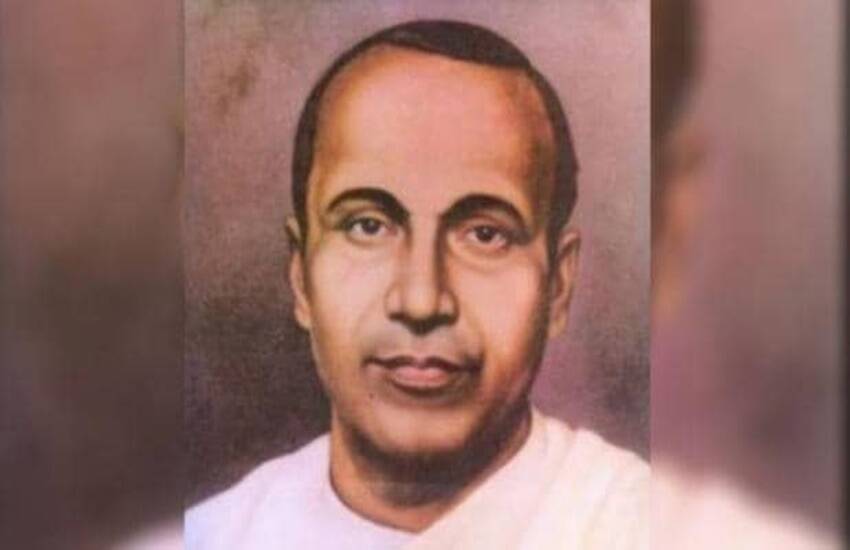Hindi literature of the 20th century is specifically known for a flurry of Urdu words replacing Hindi. However, among those shades of Urdufication, there were some shining lights. Romantic genius Jaishankar Prasad was one of them.
Early days were full of struggle
Jaishankar Prasad, a prominent figure in Hindi literature was born on this day in modern-day Varanasi. Prasad was born in a business family and his father Babu Devki Prasad also called the Sunghani Sahu was a prominent tobacco businessman of the area.
Due to the unfortunate demise of his father, Jaishankar had to halt his formal studies after class 8. But, the passion for knowledge kept igniting inside him. He continued reading history, literature and Vedas at his home. Vedas gave him in-depth philosophical knowledge, which was later manifested in his writing as well.
Jaishankar was a multilingual writer
Along with reading, Jaishankar felt an immense need to pen down his thoughts. That is why, he started to write poetry and later went on to write plays, stories and novels as well. His first book named Chitraadhar came in the Braj Vernacular of the Hindi language. The book became an instant hit in Uttar Pradesh.
Read more: Urdu vs Hindi is a war that Urdu can never win
Jaishankar soon started to write drama as well. Initially, he wrote in Khadi, Sanskrit, Persian and Bengali. Chandragupta, Skandagupta and Dhruvaswamini are some of his most notable dramas.
Read more: Param Sundari proves that you can use Sanskritised Hindi in songs and still sound cool
Romanticism in simple words
Jaishankar is mainly known for being one of the four pillars of Chhayavad (romanticism) in Hindi literature. Sumitranandan Pant, Mahadevi Verma, and Suryakant Tripathi were the other three prominent romantics of the 20th century. Jaishankar provided a brilliant intermix of philosophy, nature and love through his words.
Hearts touching emotions, simple vocabularies are some of the key features of Jaishankar’s writings. The simplicity of his writing is attributed to the fact that he avoided Persian influence in his words. Moreover, in his writing, Jaishankar prominently focused on bringing out the beauties engrained in ancient Indian traditions.
Read more: Chapter 1: Cultural impact of Mughals on Hindus: Urdufication of Hindi
Bhartiya from his core
Jaishankar was patriotic from his core. He wrote a lot about the true essence of Bhartiyata. His poem Himadri Tung Shring Se’, brought him laurels from prominent leaders involved in the independent movement. The poem was critically acclaimed as well and it earned him a lot of praise and awards.
One of the most notable works of Jaishankar Prasad is Kamayani. It is considered his best poetry collection in the Hindi language. Kamayani is a mahakabya that is still liked by the poem lovers. Through this poem, he reintroduced the characters like Manu, Ida and Shradha. It brought forward the essence of history, culture and evolution by humanizing the spirits of subjects involved.
Kanan kusum, Jharna, Chitraadhar, Lahar, Himadri Tung Shring Se, Maharana ka mahatva, Bharat Mahima, Kamayani, Aatmkathya are some of his prominent poetic contributions to Hindi literature. In 1937, Jaishankar left for his heavenly abode in Varanasi, his birthplace as well.
Critically acclaimed writer
Mahadevi Verma penned her tribute to Jaishankar in the following words, “Whenever I remember our great poet, Prasad a particular image comes to my mind. A fir tree stands on the slope of the Himalayas, straight and tall as the proud mountain peaks themselves. Its lofty head braves the assaults of the snow, the rain, and the blazing heat of the sun. Violent storms shake its spreading branches, while a thin stream of water plays hide-and-seek amongst its root. Even under the heaviest snowfall, the fiercest heat, and the torrential rain, the fir tree holds its head high. Even in the midst of the worst thunderstorm and blizzards, it remains steady and unflinching”
In an era when writers of the day we’re constantly experimenting with newer words, Jaishankar taught about the essence of their own literary heritage. He will always be remembered for giving simplistic and understandable human angles to deep knowledge enshrined in our Vedas.
